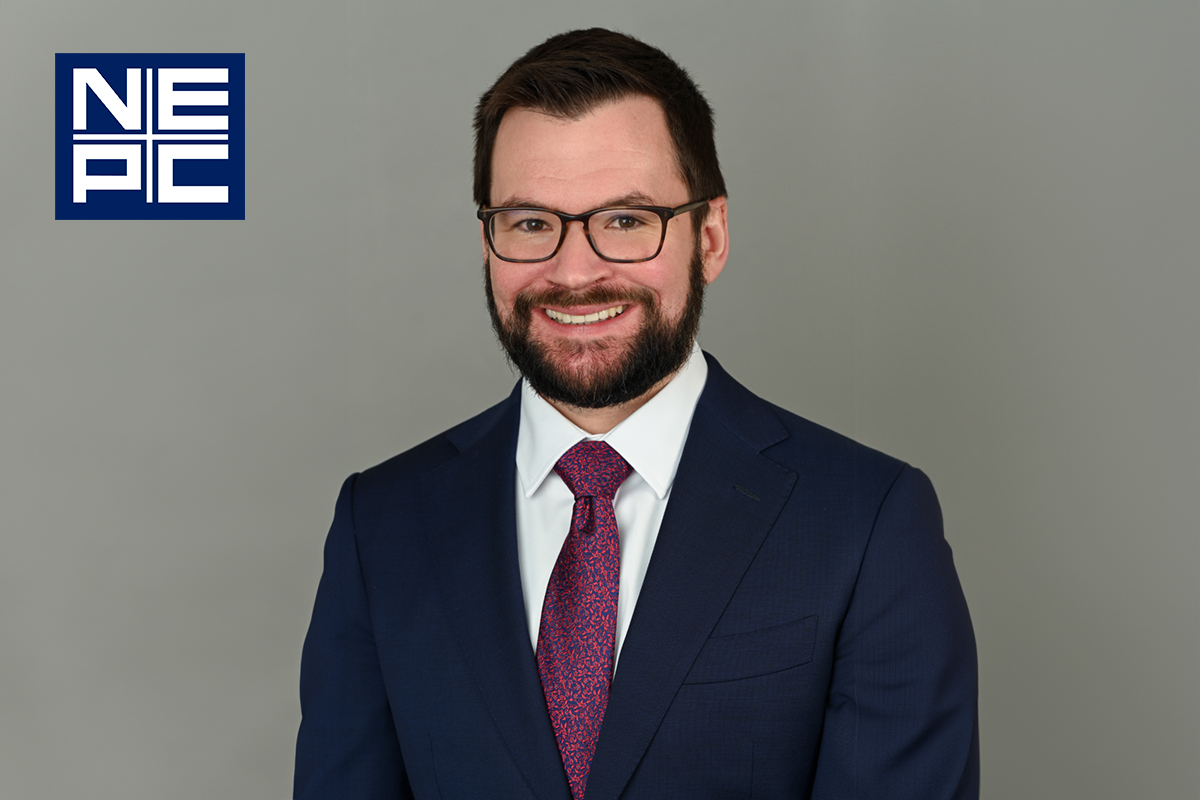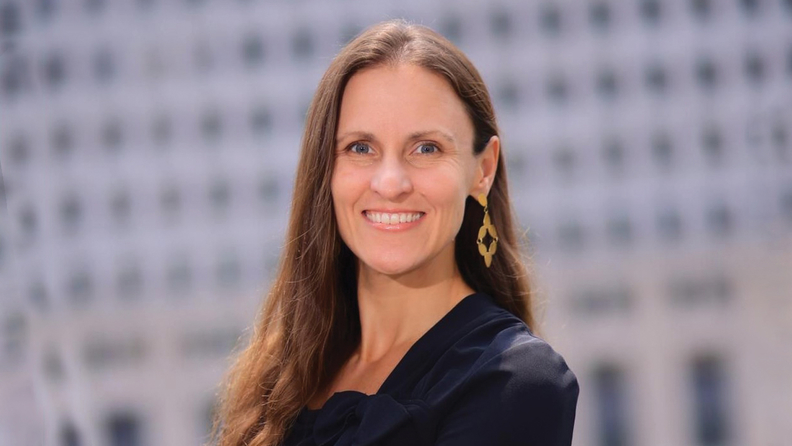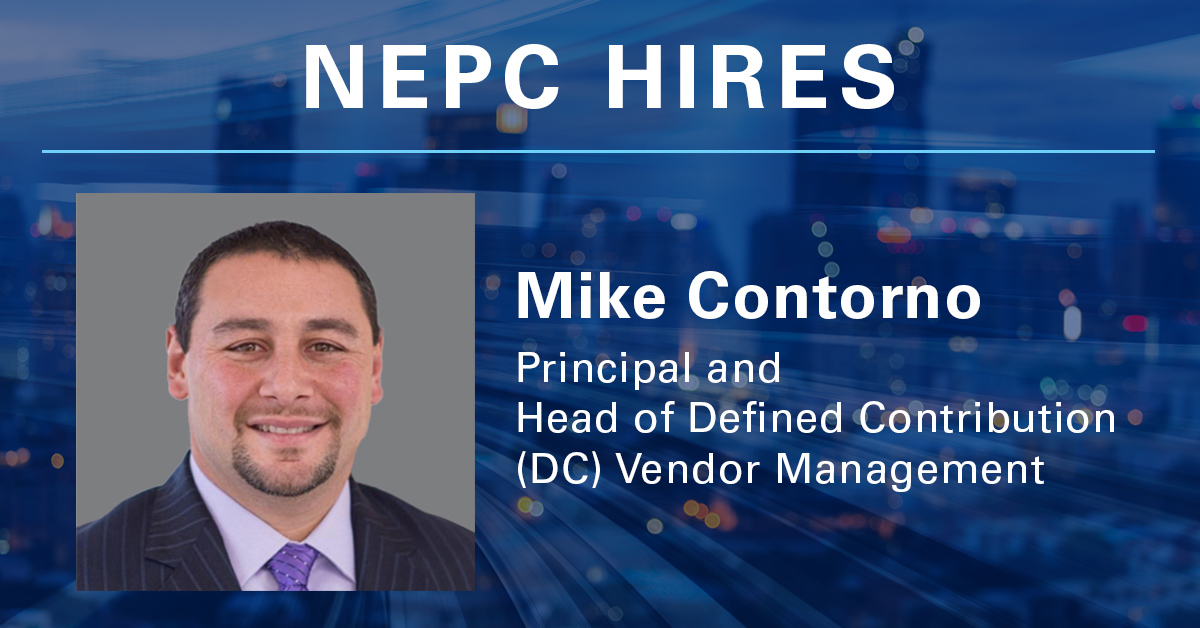Infrastructure Investor: ‘It’s Really Important Investors are Aware of the Profile’, LP Consultant Warns
NEPC’s Matt Ritter was recently featured in an Infrastructure Investor article discussing how he is not against funds that are ‘more private equity-like’, as long as LPs understand the risk. View excerpts below or read the full article on the Infrastructure Investor site here.
Investors in the infrastructure space need to be aware of the risks of the asset class as they look to meet the tailwinds of the energy transition and digital infrastructure, Matthew Ritter, partner and head of real assets at US-based LP consultant NEPC, told Infrastructure Investor.
. . .
“I think there’s really attractive opportunities for investing in infrastructure today across the board, particularly in some of these themes, ” he said. “At the same time though, I think it’s really important that investors be aware of the risk profile of what they’re investing in.
“There are strategies that are much more at the secure end of the spectrum with long-term contracted cashflows with credit counterparties, and then there’s strategies that are a little bit more private equity-like. I think there are attractive opportunities across that spectrum, but it’s important to make sure that you understand what you’re investing in and that it aligns with your goals and objectives.”
. . .
“As these themes have garnered a lot of interest, there’s been a lot of new entrants or managers launching new strategies to capitalise on these themes, ” Ritter outlined. “Some of which may call themselves infrastructure, but might actually look more like a private equity strategy in terms of the underlying risk and return profile.
“So, while total return is something we are mindful of, of course we want to be thinking about the risk that you’re taking. Is a strategy really taking on commercialisation or technology risk in a way that is not suitable for an infrastructure portfolio? Those are things we’re thinking about as well.”
. . .
“A lot of commitments were made last year, but there is definitely a subset of investors that, just by their exposure through other private markets – whether it’s real estate, private equity or other areas – there’s been decreased liquidity in the market and therefore they’re getting fewer dollars back, ” he reasoned. “That has certainly constrained their ability to make new investments to some degree.”
Click here to read the full article on the Infrastructure Investor site.
Institutional Investor: NEPC’s Sarah Samuels Expects ‘More Pain to Come’ in PE, VC
NEPC’s Sarah Samuels was recently featured in an Institutional Investor article discussing the challenges in private equity and venture capital, predicting more struggles ahead due to falling valuations and investors becoming more cautious. View excerpts below or read the full article on the Institutional Investor site here.
Private equity has been tested in recent years: Investors earned strong returns on stocks while PE struggled and alternative managers and investors couldn’t even agree on valuations. All of this has prompted a flight to safety, with investors committing most of their capital to the largest, brand name funds last year.
. . .
“I believe there’s more pain to come in venture capital marks,” Samuels told Institutional Investor.
. . .
“There’s a lot of goodwill that’s been destroyed between GPs and LPs,” Samuels said before adding, “I’m a little worried about some of the dollars in the ground today for further down marks.”
. . .
Within buyouts, NEPC isn’t seeing deals happen fast enough due to “an impasse between buyers and sellers.”
“They don’t want to meet on price,” she said. “The sellers don’t want to come down, the buyers don’t want to come up further.” Samuels added that the IPO market is open, but private companies need to be properly priced before going public.
Click here to read the full article on the Institutional Investor site.
PlanSponsor: Lower Managed Account Fees Would Likely Increase Plan Sponsor Adoption
NEPC’s white paper, “Reimagining Managed Accounts for Defined Contribution,” was recently featured in a PlanSponsor article, which highlighted NEPC’s findings that high fees on managed accounts can diminish their value, and fees above 30 basis points may necessitate higher risk to achieve returns comparable to more affordable alternatives like target-date funds. View the full article on PlanSponsor’s site here.
While defined contribution retirement plan sponsors have increasingly showed interest in offering more personalized retirement investments to their participants, widespread access to managed accounts has yet to be achieved.
. . .
“However, a recent NEPC paper found that high fees tend to erode the value of managed accounts, as a fee of 30 basis points typically requires a participant to increase their equity exposure by 20% to 30%, or by two to three TDF vintages, to achieve a similar net-of-fee return. In addition, for participants paying a lower fee of 15 basis points, for example, NEPC argued that they could anticipate returns comparable to a typical TDF investor. Even with the advice component of managed accounts, NEPC found that the added value of that feature declined over time.”
Click here to read the full article on the PlanSponsor site.
Pensions & Investments: Surging Markets Provide Huge Boost for Largest U.S. Retirement Plans
Aaron Chastain of NEPC was recently quoted in a Pensions & Investments article, where he discussed how investors are increasingly embracing private credit and global equity strategies to diversify their portfolios, mitigate risk, and pursue higher returns in light of current market conditions and uncertainty. View excerpts below or read the full article on the Pensions & Investments site here.
U.S. retirement plans in Pensions & Investments’ latest annual survey reported their strongest gains in three years, even as the portfolio payoff from diversification hit an air pocket and persistent equity market dominance by a handful of U.S. tech giants continued to dog investment teams.
. . .
Aaron Chastain, an Atlanta-based principal and corporate solutions leader with NEPC, said the steady appeal of private credit likely reflects its relatively attractive balance of risk and returns. “A lot of particularly large plan sponsors … still have return needs for their growth portfolio but are wanting to incrementally derisk as they get better funded. I think we’re seeing a little bit more focus on private credit as that middle ground,” offering high returns with both superior safety and shorter duration than something like private equity, he said.
. . .
NEPC’s Chastain said that urge to diversify away from an overconcentrated S&P 500 index has led clients to seek out more active strategies with less reliance on the Mag Seven, including global equity strategies offering broader opportunities to seek alpha.
. . .
Chastain said with credit spreads over Treasuries narrowing last year, some investors have concluded that they’re no longer getting paid to hold credit. Switching into passive Treasuries leaves them positioned more cautiously to lean into credit again in the event of market dislocations.
Policy uncertainty, asteroid mining and satellites.
Click here to read the full article on the Pensions & Investments site.
The Wall Street Journal: Stock Market News, Feb. 7, 2025: Nasdaq, Dow Fall Amid Tariff Fears and Mixed Jobs Report
NEPC’s Jennifer Appel was recently quoted in a Wall Street Journal article where she shared her advice to clients amid Trump’s recent tariff developments. View excerpts below or read the full article on the Wall Street Journal site here.
“Stocks fell Friday after a mixed jobs report showed the economy added 143,000 roles in January, slightly lower than forecast.
Adding to stock investors’ nerves, President Trump said Friday afternoon at a meeting with Japanese Prime Minister Shigeru Ishiba that the U.S. will announce reciprocal tariffs on unspecified countries next week. Analysts have warned that tariffs could push inflation higher, and in turn keep long-awaited rate cuts on the backburner for longer.”
. . .
Jennifer Appel, senior investment director at investment consulting firm NEPC, says she has advised clients to refrain from making rash trading decisions based on the rapid developments in Trump’s tariffs moves.
“There’s just been so much noise,” said Appel. “If investors try to get too cute with their portfolios or how they’re thinking about things, [they] might be making the wrong calls.”
Click here to read the full article on the Wall Street Journal site.
Barron's: 6 Steps to Raising Money-Savvy Children
NEPC’s Sarah Samuels was recently quoted in a Barron’s article where she shared insights on how to inspire elementary-aged children to develop an interest in investing. View excerpts below or read the full article on the Barron’s site here.
From preschool through adulthood, there are many opportunities to help children develop healthy financial habits.
. . .
Elementary-age children should also be taught basic investing principles, says Sarah Samuels, partner at NEPC, an institutional investment consulting firm based in Boston. To introduce her 6- and 9-year-old daughters to investing, she took them on a field trip to see the Fearless Girl statue outside the New York Stock Exchange and talked to them about financial independence and what the exchange represented.
She then preselected several well-known public companies, familiar to her children, and helped them research potential stock picks, discussing tickers, prices, and earnings growth in ways they could relate to. For example, she compared a company’s earnings growth to a child growing in height.
Investing at an early age helps foster independence and confidence that will stick with children throughout their lives, Samuels says. The day after her 6-year-old daughter made her first stock purchase, she told her mother she was going to make her own school lunch because she was now an investor.
Alternative Fund Insight: UC San Diego Foundation Tops Endowment Ranking
NEPC’s mega-endowments white paper data was recently highlighted in an article that explored higher education endowment rankings, focusing on the trend of smaller endowments superseding their larger counterparts. View the full article on Alternative Fund Insight’s site here.
The UC San Diego Foundation, which runs $1.6bn, topped the performance charts with a 15.5% gain in the year to mid-2024 as smaller endowments outperformed their bigger peers.
. . .
“Since late 2022, public large-cap equities in the US have been the performance leaders, spurred by exceptional gains for large technology corporations at the forefront of the AI revolution,” said NEPC, which compiled the annual ranking.
“This trend has been of great value to smaller and mid-sized endowments with higher US large-cap exposure.”
Click here to read the full article on the Alternative Fund Insights’ site.
Pensions & Investments: Endowments’ Fiscal 2024 Returns Boosted by AI Revolution — NEPC Report
NEPC’s mega-endowments white paper data was recently featured in an article to discuss how the artificial intelligence boom impacted the top-performing university and college endowments. View the full article on Pensions & Investments’ site here.
The top-performing university and college endowments in fiscal year 2024 had high exposures to public companies assisting in the artificial intelligence revolution, according to an NEPC report released Jan. 14.
. . .
For a second consecutive year, the largest endowments mostly trailed behind their smaller and mid-sized peers — particularly those with more exposure to public equities, wrote Colin Hatton, principal and senior consultant at NEPC’s endowments and foundation practice.
. . .
And while “it’s often true that compelling new technologies arise in the private markets first, which is a reason why the mega endowments have historically outperformed,” longstanding, U.S.-domiciled public companies such as Nvidia, Amazon and Microsoft have been responsible for 24.6% of the S&P 500’s gains, Hatton added.
. . .
Although AI drove strong returns for large-cap U.S. stocks, Hatton noted “we’re not convinced this is a trend with staying power.” He added it may be hard for technology firms to outperform earnings expectations to support high valuation multiples, which have contributed to their gains so far.
Click here to read the full article on the Pensions & Investments site.
Chief Investment Officer: UCSD Foundation Repeats as Best-Performing University Endowment in Fiscal 2024
NEPC’s mega-endowments white paper data was recently featured in an article to discuss how smaller funds with a greater focus on equities outperformed larger endowments that had higher allocations to private markets during a strong year for artificial intelligence and tech stocks. View the full article on Chief Investment Officer’s site here.
In fiscal 2024, university endowments followed a similar trend as the prior year: Endowments with a higher allocation to equites were top performers, while endowments with higher allocations to private markets often saw single-digit returns.
. . .
The median endowment, out of 78 endowments NEPC tracked, returned 11.9% in the fiscal year.
“The [UC San Diego Foundation’s] success stems from a unique approach to endowment management that is a particularly good fit for current market trends,” Colin Hatton, an NEPC principal for endowments and foundations, wrote in the NEPC report. “They utilize several University of California General Endowment Pool accounts, enhancing them with their own strategic position which consists primarily of U.S. large-cap equity. It’s a hybrid approach that allows them to benefit from the University of California Investment Office’s resources while employing an asset allocation that meets their own needs.”
. . .
“We also believe that private equity and venture capital aren’t likely to remain underperforming sectors for an extended period of time,” the NEPC report noted. “Both segments needed to endure a period of repricing in an environment of higher interest rates, but we think that cycle will come to an end now that interest rates are expected to remain stable or come down.”
Click here to read the full article on the Chief Investment Officer site.
NEPC Names Consulting Veteran Principal and Head of Defined Contribution Vendor Management
BOSTON, January 13, 2025 — NEPC, LLC, one of the industry’s largest investment consulting firms, is pleased to announce the appointment of Michael (Mike) Contorno as Principal and Head of Defined Contribution (DC) Vendor Management. Mike joins the firm on Monday, January 13, 2025, reporting to Bill Ryan, Partner and Defined Contribution Team Leader. In this role, Mike will lead NEPC’s nationwide DC vendor management search practice.
Mike’s career spans consulting roles at Marsh & McLennan and Aon, as well as a tenure at Vanguard, where he played a key role in modernizing recordkeeping capabilities. “Mike’s diverse background uniquely positions him to elevate NEPC’s DC vendor management services to new heights,” said Bill Ryan. “His expertise and innovative approach make him the ideal leader to strengthen our offerings during a time of significant industry change and consolidation.”
In his new role, Mike will support NEPC’s Defined Contribution clients by helping them evaluate and optimize relationships with recordkeepers, financial wellness providers, executive compensation plans, and overall plan governance. As demand grows for enhanced vendor management services, Mike’s role will focus on expanding NEPC’s offerings to meet client needs and drive meaningful outcomes for plan participants.
“We have quietly served our DC clients exceptionally well for over a decade,” added Ryan. “Now, with Mike on board, we’re poised to expand our capabilities publicly, ensuring our clients benefit from best-in-class evaluations of their non-investment-related vendor relationships.
Mike’s appointment highlights NEPC’s ongoing commitment to delivering innovative, tailored solutions to its Defined Contribution clients, ensuring their plans and participants thrive in a complex and rapidly shifting landscape.
About NEPC, LLC
NEPC, LLC is a leading investment consultant, private wealth advisor, and OCIO provider, serving over 400 retainer clients and $1.7 trillion in total assets. Combining a proprietary investment team dedicated to the long-term challenges facing investors with our client-centric model, NEPC builds forward-looking investment portfolios for institutional investors, ultra-high-net-worth individuals and families. To learn more visit nepc.com.









